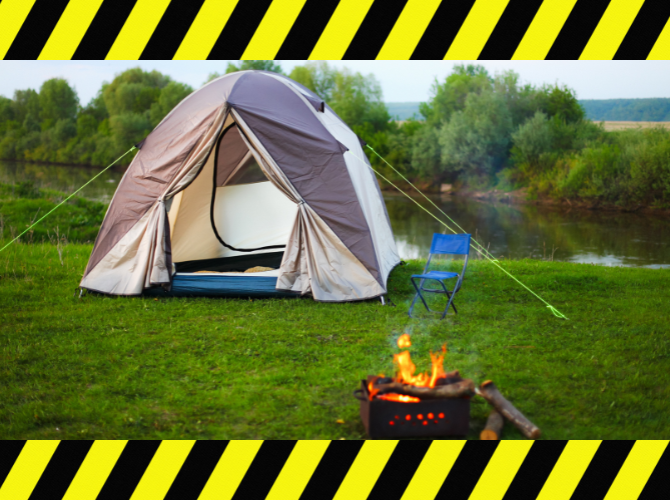As with all activities, camping is not without its risks. You can prepare yourself for the camping dangers by looking at them.
Sunburns
The most dangerous danger of camping is sunburn. Overexposure to the sunlight can cause sunburns. Untreated sunburns are not just painful, but they can cause permanent damage to your skin.
Sunburn prevention is all about taking the right steps to keep your skin protected while enjoying the outdoors. You can protect your skin against UV rays by wearing protective clothing, such as sunglasses or long-sleeved tops. Applying and reapplying sunscreens with SPF 30+ to exposed skin is essential. Limiting sun exposure is important, especially during the peak of daylight hours between 10am-4pm.
You can relieve your sunburn by taking a few simple steps. Drink plenty of liquids, and take cool showers to cool the skin. You can also apply a cold compress or use an over-the-counter medication like ibuprofen, to reduce the inflammation. Finally, moisten the area with lotion or aloe Vera gel.

Poisonous Plants
It is impossible to overstate the dangers of camping with poisonous plants. From minor irritations of the skin to potentially life-threatening problems, poisonous plants have a variety of effects. It is vital to know the local plants so you can take precautions or avoid them.
Before heading out, it’s important to do some research on the plants that are found nearby. Poison ivy and poisonous mushroom are some of the most common poisonous plants in nature. These plants may cause severe allergic reactions, rashes or other symptoms. You can also ingest plants that are poisonous, which may cause nausea, vomiting or death. It is therefore important that you become familiar with the plants around and avoid eating any plants, mushrooms or fruits which are unknown.
You should also be mindful of seasonal conditions, as certain plants can be poisonous at specific times. Wearing protective clothing like long sleeved shirts, pants and gloves is essential when near poisonous plants. Last but not least, keep your children and animals away from any potentially toxic plants.
Dehydration
When camping in a hot, dry climate dehydration is a real danger. To prevent dehydration, it’s important to remain hydrated while outdoors. Dizziness, headaches, fatigue and dry mouth are all symptoms of dehydration. Dehydration, if not addressed, can cause serious health problems such as kidney failure, heat stroke and death. It is essential to stay hydrated by drinking plenty of water throughout the day. This is a buzz killer.
Wearing light clothes and wearing a sun hat will help protect you from harmful rays of the sun. Also, seek shelter whenever possible. It is also important to make sure you have access to drinking water.
Insects
Other biting insects, such as mosquitoes, can be irritating and can also spread disease. The tick can be found in grassy or wooded areas. The ticks are capable of spreading diseases, such as Rocky Mountain spotted virus and can cause irritation to the skin. Bees, wasps, and other stinging insects can be a danger to those who are allergic to their venom. Many people are allergic to fire ants, which can be found throughout the world.
Camping is a great time to take steps to protect you and your family from insect bites. The number of insect bites can be reduced by wearing loose, light colored clothing. You can lower the chance of being bitten by insects by using an insect repellent, avoiding standing water and tall grasses and wooded area and wearing insect repellant. When camping, it is a great idea to keep a first-aid kit on hand and become familiar with symptoms of insects-borne diseases.
Fire
It is important to take preventative measures against fire, as it can be a serious hazard. Fire safety is essential when camping. Never leave a fire unattended and always control it. Campers should be made aware of fire hazards and how to build and camp safely.
You should also be conscious of the environment you are in when camping. Be aware of potential fire hazards, such as trees, dry brush or any other combustible material near your campsite and campfire. Be sure to know the rules and restrictions in your area regarding fires and use only appropriate fuel on your campfire. Always dispose of coals, ashes and any other combustible material in a safe manner. Also make sure you extinguish the fire completely before leaving. Keep a nearby fire extinguisher and a plan for fire safety in the event of an emergency.
Poor Weather
When camping, bad weather presents a variety of dangers. High winds can topple trees, cause items to blow away and create dangerous conditions for campers. Flash flooding can be caused by heavy rains or hail, which can damage the campsite and wash items away. It can also create dangerous conditions for campers. Hypothermia, frostbite and heat exhaustion can be caused by extreme cold or snow. Campers are also at risk from lightning strikes, which can be very dangerous. It is vital to stay informed about the current weather and take any necessary precautions in order to keep yourself and your camp safe.
Pollution
Pollution is a serious problem. Pollution comes from many sources. The effects of pollution can be detrimental to our health as well as the environment. The exposure to air pollution may cause cardiovascular diseases, respiratory illnesses and irritation of the skin. The pollution can also make water unfit for drinking and swimming. This can cause long-term effects on the wildlife, and even change the local environment. While camping, it’s important to stay aware of possible sources of pollution like nearby factories and power plants. Also take precautions to protect the environment. It may be necessary to minimize activities which produce pollution, such as the burning of wood or operating engines with internal combustion.